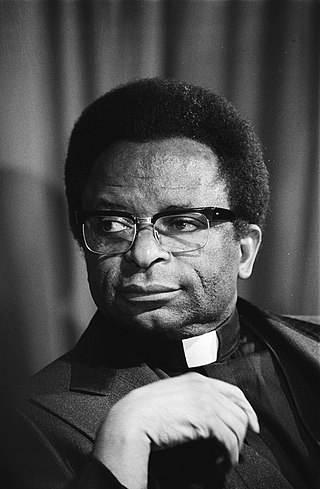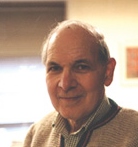Gwinyai Henry Muzorewa is a Zimbabwean clergyman, politician and the president of the United African National Council (UANC).
Contents
Muzorewa is a professor of theology at Lincoln University. [1]
Gwinyai Henry Muzorewa is a Zimbabwean clergyman, politician and the president of the United African National Council (UANC).
Muzorewa is a professor of theology at Lincoln University. [1]
Muzorewa is the younger brother of late former Zimbabwe-Rhodesia Prime Minister Bishop Abel Muzorewa, who led the country between 1978 and 1979. [2]
He earned his Master of Divinity from Garrett Evangelical Seminary and his Master of Philosophy and Doctor of Philosophy from Union Theological Seminary.
Muzorewa was a leader at Epworth Theological College in Zimbabwe and later became chair of the Department of History, Political Science, Pan-African Studies, Philosophy, and Religion at Lincoln University. [3]
Muzorewa has authored several books that include:
Muzorewa donates part of his salary to Lincoln University's scholarship fund for first-generation college students, many of whom are from impoverished neighbourhoods in New York, Washington, D.C. and Philadelphia.
Muzorewa has dedicated time and effort to helping orphans and widows affected by the Zimbabwe War of Liberation.
In 2018, Muzorewa approached the High Court seeking an order to compel the Zimbabwe Electoral Commission to accept his nomination papers. [4] The Zimbabwean Election Commission had refused to accept Muzorewa's presidential nomination papers for having filed them late. Muzorewa said the delays were caused by officials at the Registrar-General's Office (RG) who took too long to issue him a replacement birth certificate. Muzorewa's name ultimately did not appear on the ballot.
Muzorewa was a candidate for the 2023 Presidential election for the UANC party. [5] The other candidates are: [6]
Theology is the systematic study of the nature of the divine, or more broadly of religious belief. It is taught as an academic discipline, typically in universities and seminaries. It occupies itself with the unique content of analyzing the supernatural, but also deals with religious epistemology, asks and seeks to answer the question of revelation. Revelation pertains to the acceptance of God, gods, or deities, as not only transcendent or above the natural world, but also willing and able to interact with the natural world and to reveal themselves to humankind.

Zimbabwe Rhodesia, alternatively known as Zimbabwe-Rhodesia, also informally known as Zimbabwe or Rhodesia, was a short-lived sovereign state that existed from 1 June 1979 to 18 April 1980, though lacked international recognition. Zimbabwe Rhodesia was preceded by another state named the Republic of Rhodesia and was briefly under a British-supervised transitional government sometimes referred to as a reestablished Southern Rhodesia, which according to British constitutional theory had remained the lawful government in the area after Unilateral Declaration of Independence (UDI) in 1965. About three months later, the re-established colony of Southern Rhodesia was granted internationally-recognized independence within the Commonwealth as the Republic of Zimbabwe.

Abel Tendekayi Muzorewa, also commonly referred to as Bishop Muzorewa, was a Zimbabwean bishop and politician who served as the first and only Prime Minister of Zimbabwe Rhodesia from the Internal Settlement to the Lancaster House Agreement in 1979. A United Methodist Church bishop and nationalist leader, he held office for only a few months.

The United African National Council (UANC) is a political party in Zimbabwe. It was briefly the ruling party during 1979–1980, when its leader Abel Muzorewa was Prime Minister.

James Hal Cone was an American Methodist minister and theologian. He is best known for his advocacy of black theology and black liberation theology. His 1969 book Black Theology and Black Power provided a new way to comprehensively define the distinctiveness of theology in the black church. His message was that Black Power, defined as black people asserting the humanity that white supremacy denied, was the gospel in America. Jesus came to liberate the oppressed, advocating the same thing as Black Power. He argued that white American churches preached a gospel based on white supremacy, antithetical to the gospel of Jesus.

Diogenes Allen was an American philosopher and theologian who served as the Stuart Professor of Philosophy at Princeton Theological Seminary. He was an ordained minister in the Presbyterian Church, which he served from 1958. He died in Newtown, Bucks County, Pennsylvania.

The Internal Settlement was an agreement which was signed on 3 March 1978 between Prime Minister of Rhodesia Ian Smith and the moderate African nationalist leaders comprising Bishop Abel Muzorewa, Ndabaningi Sithole and Senator Chief Jeremiah Chirau. After almost 15 years of the Rhodesian Bush War, and under pressure from the sanctions placed on Rhodesia by the international community, and political pressure from South Africa, the United Kingdom, and the United States, the Rhodesian government met with some of the internally based moderate African nationalist leaders in order to reach an agreement on the political future for the country.
The Oxford Faculty of Theology and Religion co-ordinates the teaching of theology at the University of Oxford, England. It is part of Oxford's Humanities Division.
James Dean Strauss was an American theologian who was professor of theology and philosophy at Lincoln Christian Seminary from 1967-1994. He has been described by many as the Albert Einstein of the Restoration Movement.

General elections were held in Rhodesia in April 1979, the first where the majority black population elected the majority of seats in parliament. The elections were held following the Internal Settlement negotiated by the Rhodesian Front government of Ian Smith and were intended to provide a peaceful transition to majority rule on terms not harmful to White Rhodesians. In accordance with the Internal Settlement, on 1 June, Rhodesia officially became the nation of Zimbabwe Rhodesia, under the government of the United African National Council elected in the 1979 elections. The Internal Settlement was not approved internationally but the incoming government under Bishop Abel Muzorewa did decide to participate in the Lancaster House talks which led to the end of the dispute and the creation of Zimbabwe.

General elections were held in Southern Rhodesia between 14 February and 4 March 1980 to elect the members of the House of Assembly of the first Parliament of the independent Zimbabwe. As stipulated by the new Constitution of Zimbabwe produced by the Lancaster House Conference, the new House of Assembly was to comprise 100 members, 80 of whom would be elected proportionally by province by all adult citizens on a common role, and 20 of whom would be elected in single-member constituencies by whites on a separate roll.

Zimbabwe Electoral Commission (ZEC) is an independent Chapter 12 institution established in terms of Section 238 of the Constitution of Zimbabwe; which is responsible for the management and administration of Zimbabwe's electoral processes. It was initially established by the act of Parliament in 2004, with influence from its predecessor, the Electoral Supervisory Commission as well as the Southern African Development Community.

The Victoria Falls Conference took place on 26 August 1975 aboard a South African Railways train halfway across the Victoria Falls Bridge on the border between the unrecognised state of Rhodesia and Zambia. It was the culmination of the "détente" policy introduced and championed by B. J. Vorster, the Prime Minister of South Africa, which was then under apartheid and was attempting to improve its relations with the Frontline States to Rhodesia's north, west and east by helping to produce a settlement in Rhodesia. The participants in the conference were a delegation led by the Rhodesian Prime Minister Ian Smith on behalf of his government, and a nationalist delegation attending under the banner of Abel Muzorewa's African National Council (UANC), which for this conference also incorporated delegates from the Zimbabwe African National Union (ZANU), the Zimbabwe African People's Union (ZAPU) and the Front for the Liberation of Zimbabwe (FROLIZI). Vorster and the Zambian President Kenneth Kaunda acted as mediators in the conference, which was held on the border in an attempt to provide a venue both sides would accept as neutral.

Lazarus McCarthy Chakwera is a Malawian politician and theologian who has served as President of Malawi and minister of defence since June 2020. He also serves as minister of defence per Malawian constitution, he has served as the leader of the Malawi Congress Party since 2013. He was President of the Malawi Assemblies of God from 1989 to 2013.

General elections were held in Zimbabwe on 29 March 2008 to elect the President and Parliament. Because of Zimbabwe's dire economic situation, the elections were expected to provide incumbent President Robert Mugabe with his toughest electoral challenge to date. Mugabe's opponents were critical of the handling of the electoral process, and the government was accused of planning to rig the election. Human Rights Watch said that the election was likely to be "deeply flawed."

Canaan Sodindo Banana was a Zimbabwean Methodist minister, theologian, and politician who served as the first President of Zimbabwe from 1980 to 1987. He was Zimbabwe's first head of state after the Lancaster House Agreement that led to the country’s independence. In 1987, he stepped down as President and was succeeded by Prime Minister Robert Mugabe, who became the country's executive president. In 1997, Banana was accused of being a homosexual, and after a highly publicised trial, was convicted of 11 counts of sodomy and "unnatural acts", serving six months in prison.
Ronald Takawira Douglas Sadomba was a Rhodesian politician who served in the House of Assembly from 1970 to 1979. In 1979, he served in the Parliament of the short-lived Rhodesian successor state, Zimbabwe Rhodesia, prior to Zimbabwe's independence. He entered politics as a member of the Centre Party, and changed parties several times, joining throughout his career the African National Council, the United African National Council, ZANU–PF, and United Parties.
Ernest Leonard Bulle was an academic and politician who served as a minister in the governments of Rhodesia and Zimbabwe Rhodesia. He served in the cabinet of Rhodesia as joint Minister of Finance and Minister of Commerce and Industry alongside David Smith from 1978 to 1979 as part of the country's Internal Settlement. He continued as commerce minister in the government of Zimbabwe Rhodesia between June and December 1979. First elected to parliament in the 1979 Zimbabwe Rhodesia general election, he stood unsuccessfully in the 1980 general election, which set the membership of the first parliament of the independent Zimbabwe. Bulle was a member of the United African National Council and served as the party's second vice-president.

General elections were held throughout Zimbabwe on 23 and 24 August 2023 to elect the president, legislators and councillors. The main race for presidential office was between two candidates of Karanga origin: ZANU–PF's Emmerson Dambudzo Mnangagwa and Citizens Coalition for Change's Nelson Chamisa. The voter rolls for the election increased to 6.5 million, up from 5.8 million in 2018.
Elisabeth Isabel Valerio is a Zimbabwean businesswoman and politician who is leader of the United Zimbabwe Alliance (UZA). She was the only female candidate for president in the 2023 Zimbabwean general election.